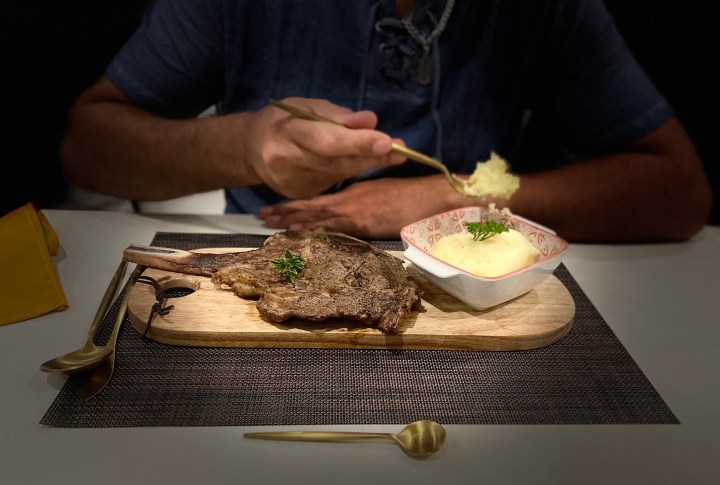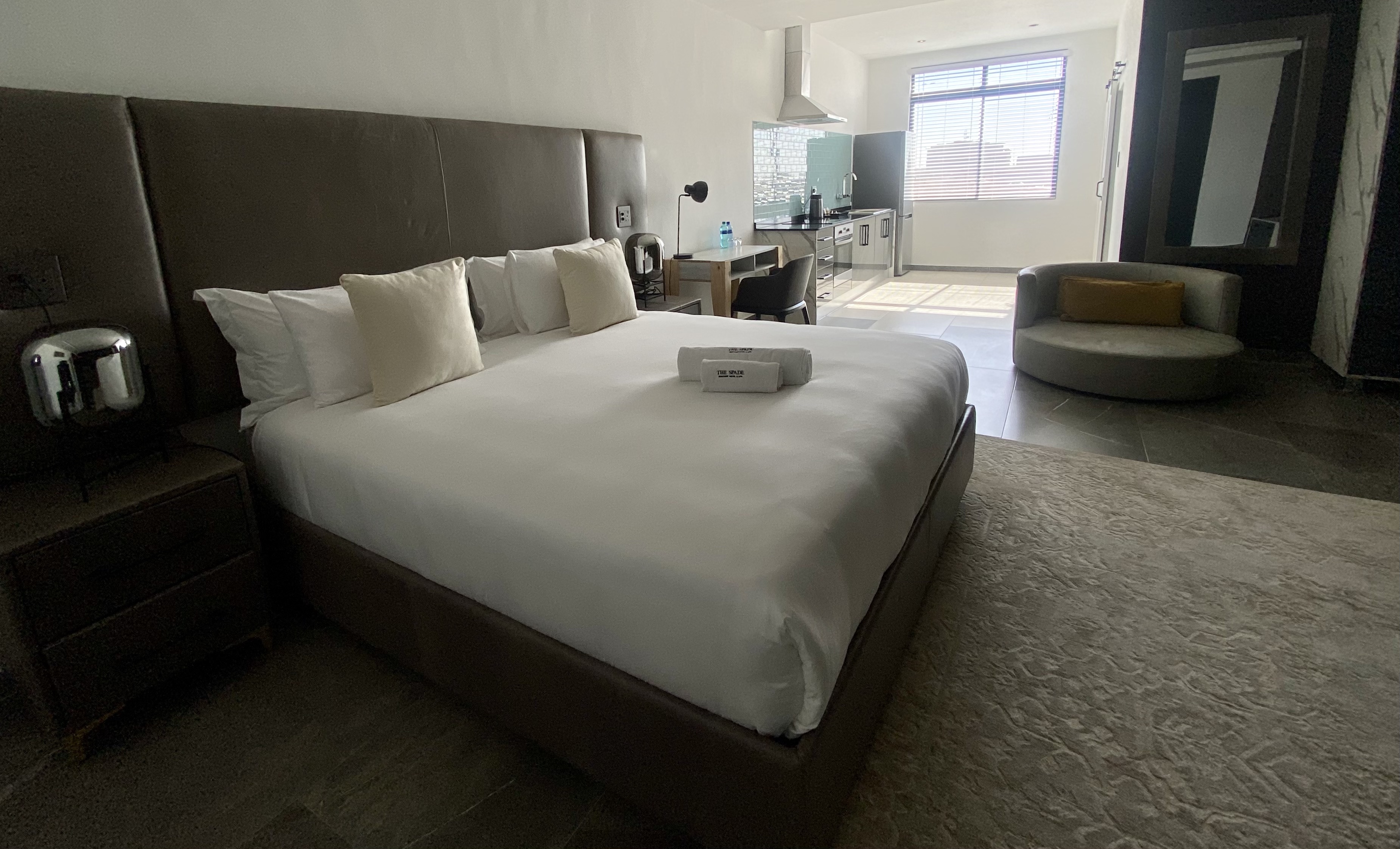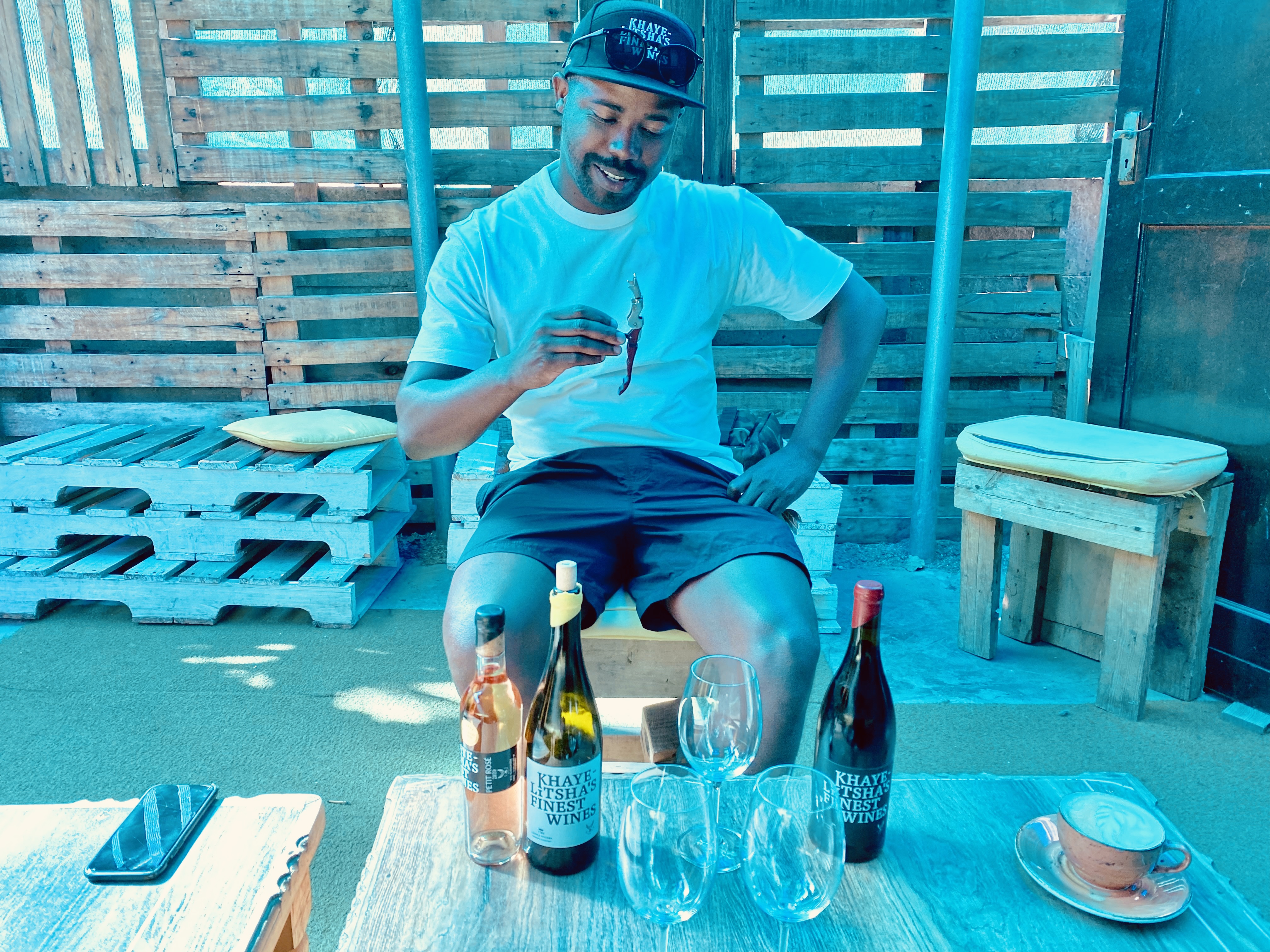TOWNSHIP VENTURES
Khayelitsha grabs a slice of the Cape tourism pie

In Khayelitsha (it means ‘New Home’), one of the largest townships in South Africa, ambitious people are creating opportunities for themselves and for their community. The result is something you need to see for yourself.
While following Google Maps’ directions you will be driving and suddenly you’ll turn a corner and there it is: a modern grey-painted building rising above the surrounding houses.
Annette and Bulelani Skaap are the owners of Spade Boutique Hotel and Spa, which opened in December 2021. Someone asked me where in Khayelitsha it is, and I had to confess I could not accurately say. I was using Google Maps, and am as unfamiliar with the area as I am with Joburg, with little more than compass points to guide me. The hotel’s Twitter says it’s “in the heart” of Khayelitsha so we will go with that. Also, it’s a few minutes’ drive to places like Siki’s Koffee Kafé and The Milk, both of which I visited.
The foyer at Spade is lavish, there is a pool, bar, restaurant, and gym. The 13 rooms (and I assume the rest are similar to ours) are spacious and modern. We had a kitchenette with a stove, tea and coffee making facilities, and biscuits. I do love a little biscuit with my morning tea. The en-suite bathroom had a shower and a large tub.

Spacious and modern, with a kitchenette: our room at Spade Boutique Hotel. (Photo: Bianca Coleman)
Annette Skaap is a former flight attendant turned entrepreneur, digital content creator with a large social media following, wife and mother; and Bulelani is also known as Ace. He is warm and friendly, keeping a low-key and humble profile as he’s on the floor working alongside his staff while dealing with a crazy busy Thursday night when there’s a lamb shank special on the menu, the restaurant is fully booked with tables being set up in the foyer to accommodate guests, and everyone is there dressed to the nines and having a great big party.
The family business portfolio stretches back 15 years and includes the double-storey Kwa-Ace Lounge with its VVIP rooftop pool, Kwa-Ace Kitchen and Kwa-Ace eParkin. Later, at The Milk Restaurant & Bar, manager Natasha Ngomela said Ace’s businesses are their competition but “there’s enough here for everyone to have a slice of the pie”.
The Milk was/is Siphelo “Spelo” Jalivane’s longtime dream to open a three-storey fine dining restaurant in Khayelitsha. In another pandemic tragedy, it opened officially in 2018 only to close in 2020, although it was a blessing in disguise. During that time, Jalivane reassessed his business and partnered with brothers Mfundo and Mshayi Mbeki, who are co-owners of Rands Cape Town, directly across the road from The Milk. The two venues work in tandem with each other.
At lunchtime on Friday, the fires are being lit for the shisa nyama. “Is that a jol on the weekend?” I asked, as Ngomela was showing me around The Milk. She stopped, turned to me and said with a smile: “Bianca. From Thursday to Sunday.”

The Milk is the realisation of a years’-long dream for Spelo Jalivane. On the second of the three storeys, you can get a very tasty burger. (Photo: Bianca Coleman)
At The Milk, the ground floor is a liquor store. Up one flight is the restaurant, which is open for breakfast (all day), lunch and dinner. I had a very tasty burger, with bacon, egg, cheese and avo – all the good stuff. And on the top floor is the Champagne Bar. And I mean Champagne. And Cognac. And whisky. This is high end premium brands only, in a lounge setting where you can smoke your cigars; and with DJs spinning tunes and its wraparound view of Khayelitsha, it’s another place to sparkle and shine.
While well supported by locals, Ngomela said they get their share of international traffic too, with visitors from Germany, the Netherlands, and the UK.
“There is the perception that it’s dangerous in Khayelitsha but it has so many other things it offers,” said Ngomela.
So those are the big guys, with multiple storeys. I met Sikelela Dibela in October 2021, at an Indonesian coffee cupping at Origin in De Waterkant. At the time, he told me about his business in Khayelitsha, Siki’s Koffee Kafé, and that the arrival of his roaster was imminent. It took six months but I finally got there.

Sikelela Dibela, founder of Siki’s Koffee Kafé and the owner of the only roaster in the township. (Photo: Bianca Coleman)
“I’m not a roaster. I’m just a roaster owner,” said Dibela, who has a guy who comes in to do the roasting when necessary.
“The whole conversation here is to be in charge of our product and be in the heart of creating it.”
For the first five years, Dibela was buying in his coffee from outside sources. Now with two Koffee Kafés – the other being in Claremont – and post-Covid, the business had to evolve. “I wanted the roaster to roast for myself and my cafés,” said Dibela. “And for new people who want to tap into this industry, those who want to start their own coffee shops, those who have existing establishments like Spade, Rands, Milk, and others looking into serving coffee. Now I’ll be in the position to supply them with coffee.”
Right now, everybody who is making and serving coffee in the township is buying it from somewhere else, said Dibela. He saw a gap in the market and is the only roaster owner in Khayelitsha – or the whole of South Africa, if you are talking townships, he added. Dibela gets his beans from Rwanda, Ethiopia, and Kenya to ensure a fully African product. “There is something about African coffees that I feel like still needs to be explored, all these flavours,” he said. “The nice thing about having a roaster is you can play around… a bit of this, a bit of that – what do I want to give my customers today?”
Dibela dropped out of school in Grade 9, and got a job as a dishwasher at Vida, where he was introduced to the coffee world, and worked his way up to store manager. When the franchise planned to expand into the UK, Dibela was one of the five staff members selected to do that. “I was there for two years, and had the best time of my life, learning about different cultures. I thought maybe this coffee thing can work if I take it back home.” After working at a few places in Cape Town, Siki’s Koffee Kafé opened in 2016.
“I had the idea to do it in a container but I had some money saved up, and had the conversation with my mother and we added this extension to her house.”
The vision began with a coffee machine, grinder, muffins and cookies. There wasn’t even any signage. Now, there is a front section where the coffee is made, and counter seating. At the back is a lounge area, an office with computers and internet, a small private lounge, and the roaster room. Which used to be Dibela’s bedroom.
Dibela is always looking at ways to raise awareness of coffee culture in the township because “people here, they’re used to instant coffee, which is bitter and often taken with too much sugar,” he said. How, or why, are they going to come to a cafe and buy coffee? “The concept of meeting at a place like this was perceived as something you do in town, not here. Here we live. I had to change that mindset.”
By creating events and collaborations with other entrepreneurs in Khayelitsha, like poetry night sessions, the word was spread and it became known the coffee shop was the place to be, for young creatives and entrepreneurs. “I dream of people coming here to interact because if you understand the conversation of the township, it is that not much is happening in the township – it always happens elsewhere. So we try not to be in a negative conversation. Here we are developing our community.”
In addition, Dibela leans towards slightly sweeter blends to appeal to the palate of coffee drinkers accustomed to lots of sugar. It’s better for their health, he says, and they are more conscious of what they are consuming and therefore make better choices.

Lunga Raphahlela is learning barista skills at Siki’s Koffee Kafé. (Photo: Bianca Coleman)
Dibela said he is grateful for what he’s been able to do, and to become the platform he envisaged for people to use. “No one who has been here is sitting at home; they are employed right now. They can use the WiFi here to apply for the job, or make a bit of money to get to that interview.”
Siki’s is open Mondays to Fridays 7am to 5pm, Saturdays 8.30am to 3.30pm.
I didn’t even have to go anywhere for my next meeting, which was a tasting with Lindile Ndzaba, of Khayelitsha’s Finest Wines. In fact, he and Dibela went to school together, and his is another triumphant tale: after failing matric, Ndzaba was pressured at home to get a job and contribute to the household. He got his entry into the hospitality industry in 2009 at And Union, in Cape Town, cleaning floors and washing dishes. Although it was predominantly a beer place, the venue did wine events as well, and it was there that Ndzaba was exposed to the wine wine culture which never existed in the township. He worked closely with sommeliers who were hosting tastings, polished wine glasses, and helped wine makers, all the while forming connections and building relationships over the years.

Lindile Ndzaba of Khayelitsha’s Finest Wines. (Photo: Bianca Coleman)
“Honestly, wine was never my thing. It took me a while to understand it, the different flavours, aromas, different pairings with food. I was so determined I put my head down and learnt as much as I could. So that’s where it all began,” he said.
The wine was a side hustle until very recently (as in less than a month). Now Ndzaba is running it full time himself, including his very cool social media (@khayelitshasfinestwines on Insta), and loving it.
The business began in 2018, and of the name, Ndzaba said: “I’m from here. It’s not just about me, it’s about the community. There’s so much negativity on the news and this is something positive coming out of the township. It’s showcasing entrepreneurs like us, Siki, to do good and shouting out the positivity, and also to inspire the upcoming generation by creating this path for them to elevate things. To show them what is possible.”
While there are garagiste winemakers in Khayelitsha, and Ndzaba says he’d definitely like to do something like that too, “there aren’t any resources to produce wine here. For me it was pretty clear I need to collaborate with the vineyards to make my brand possible.” And thus, the whole project is built on collaborations, with Ndzaba visiting wine farms, meeting winemakers and tasting wines. And they’ve got to be good. If he doesn’t like it he’s not putting his name on it. “I’ve turned some down,” he admitted.

Two exceptionally good wines; sadly the Cab Franc is sold out but the white blend is available. (Photo: Bianca Coleman)
Ndzaba aims to have at least one red and one white wine available in the range at any given time, which changes depending on availability because these are exclusive small batches; there was a Petite Rosé, which was Petité Verdot in a petite 375ml bottle, from Opstal in the Slanghoek valley, but that’s sold out (and my bottle has been drunk). There was – was, mind you – an absolutely heavenly Cabernet Franc, a 2020 vintage from grapes in the Polkadraai Hills of Saxonburg in Stellenbosch. That too is completely sold out. I nabbed the last magnum, sorry not sorry.
Introducing the wine to me, Ndzaba said it is something more traditional, and something he is proud of. “There are people celebrating this variety but it’s not getting the love it deserves. It was made with Dirk van Zyl, cellarmaster and winemaker at Saxonburg. This is our third batch. It’s still in its youthful days, but travelling well on the palate.”
Ndzaba wanted to buy from the 2021 vintage but wasn’t not available so it will be a while before it comes around again. However, he does have 900 litres of Pinot Noir, and a bespoke Syrah Malbec Pinotage blend on hand for the next release at the end of April.
The white, on the other hand, is still available. I never pretend to be any kind of wine expert but I can always tell you when a wine is delicious, and this is one the finest I’ve tasted in I don’t even know how long. It’s a blend of 30% Chenin Blanc, 30% Chardonnay, and 10% each of Grenache Blanc, Roussanne, Verdelho, and Viognier, a 2017 vintage. I immediately ordered a case right there on the spot.
“For this one I worked with Boplaas in Calitzdorp, with Leon Coetzee. This is our third batch together; he makes the best blends,” said Ndzaba . “The interesting thing about Leon is he sources grapes from different regions – Swartland, Klein Karoo, Stellenbosch – he gets them in, then ferments them separately, ageing in French oak, and then into stainless steel tanks to blend. Then he ages them for another six months, so the wine integrates nicely.
“It’s a bit like a potjiekos,” he laughed. “The way it’s showing is still very expressive. You can pick it up on the nose. This is one of my best blends. Lip smacking and generous.”
If you only ever use one phrase to describe a wine you love, then lip-smacking is it.
Khayelitsha’s Finest Wines are available from various outlets around the country, or hit Ndzaba up on social media. When the white blend is sold out, he has a blanc fumé lined up, hooray.
“In the townships the wine is completely undrinkable to me, it’s unpleasant,” said Ndzaba. “Most wines sold here at taverns and shebeens. You find guys diluting it with Coke. This is not how one is supposed to enjoy it. This is why I’m trying to do something different, and much more pleasant.”
Ndzaba’s wines can be found on wine lists in about 19 restaurants, and in a couple of taverns even.”But obviously the price point is still a challenge,” he said.
Cape Town offers more than world-class attractions, and visitors are rightfully encouraged to experience our local cultural heritage when visiting any of our neighbourhoods and local communities, says Enver Duminy, Cape Town Tourism CEO.
“It makes sense to introduce a wider audience to the vibrant tourism experiences that add an essential dimension to our city. As an organisation, we encourage tangible initiatives to produce meaningful results and drive accessibility and sustainability within local communities, including Khayelitsha.
“As a result of the Covid-19 pandemic the tourism economy was hit hardest, and we are desperately needing to restart our tourism engines as there are many lives affected directly and indirectly by tourism,” he continued. “This is why we are in awe of citizens like Annette and Bulelani Skaap who drive employment and make a concerted effort to establish gems within these hidden communities.”
Our visit to Khayelitsha was all just a tease and a taste over 24 hours, and ultimately so rewarding. I do hope more people will step out of their comfort zone and experience what Khayelitsha has to offer. DM/TGIFood
Follow Bianca on Instagram @biancaleecoleman; also @sikis_koffee_kafe, @thespadeboutiquehotel and @eatatthemilk
The writer supports the Gift of the Givers Foundation, the largest disaster response, non-governmental organisation of African origin on the African continent.





 Become an Insider
Become an Insider
Simply inspiring… will be scheduling a coffee/wine tasting/lunch outing very soon!
I really enjoyed this article. It bustled with African energy.